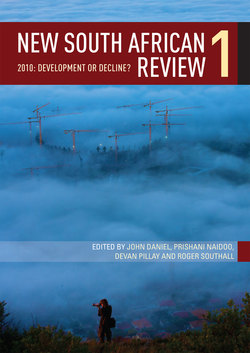Читать книгу New South African Review 1 - Anthony Butler - Страница 17
На сайте Литреса книга снята с продажи.
PART 1 ECONOMY, ECOLOGY AND SUSTAINABILITY INTRODUCTION South Africa and the eco-logic of the global capitalist crisis
ОглавлениеDevan Pillay
South Africa has been severely affected by the global financial crisis. Despite a return to growth in 2010, the crisis will come back as long as its fundamental roots are not addressed. Indeed, we need to ask whether the crisis is a purely ‘financial’ one, or multidimensional. Is it of recent origin, or something that began with the market liberalisation of the late 1970s – or does it go right back to the origins of capitalism as a world system, of which South Africa is a microcosm?
Despite the fact that SA’s financial sector was much better regulated than at the centres of the global system, the financial crisis has deepened an already severe socio-economic crisis. As the chapters that follow show, it accelerated declining manufacturing output or the deindustri-alisation of the economy, partly because of a decline in global demand and partly because of the rand’s rise against the British pound and US dollar. Most severely, up to one million jobs were lost in 2009, in a context of massive unemployment (unofficially close to 40 per cent of economically active citizens), rising social inequality and persistent poverty. To take two telling indices: over one-third of the population is food insecure, and a quarter of children under six years of age is malnourished (Human Sciences Research Council, cited in Andrews 2008).
At a fundamental level, there are increasing indications that the country’s growth trajectory faces a crisis of ‘sustainability’ in both senses of the word – sustainable growth that creates decent jobs and rising living standards for all, as well as sustainable growth that protects the natural environment and leaves the earth with sufficient resources for future generations. This crisis is rooted in the structure of the South African economy, which was inherited from the colonial past.
In South Africa, racial capitalism emerged as a result of a minerals-energy complex (Fine and Rustomjee 1996) – a synergy between the mining industry and fossil energy systems that sustain it, as well as a financial sector that grew out of it. This minerals-energy-financial complex remains central to South African capitalism, subordinating all other economic activities, including manufacturing. It rests on the exploitation of fossil fuels and risky mining operations that have seen the death of tens of thousands of people over the last century. A slowly dera-cialising minority experiences the only tangible benefits, whilst the (mainly black) majority live in conditions of underdevelopment in the predominantly rural former homelands, or in polluted slums and townships in the urban areas.
Efforts to move out of this dependence have been half-hearted. The only strategy the state has so far embarked on is a combination of limited redistribution (mainly poverty alleviation through grants), an incoherent land redistribution programme, short-term public works programmes, repeated attempts at an industrial policy and a gradually visible but hitherto lame ‘sustainable development’ effort. These are undermined by a logic of accumulation that maintains at its centre the minerals-energy-financial complex – as well as a culture of consumerism that rests on ever-expanding, unsustainable wants, fuelled by a sales effort (the advertising/media industry) that is essential to the production/accumulation process.
This logic of uneven (or enclave) capitalist development is, in many ways, a microcosmic expression of global capitalist development. The crisis of sustainability is integrally linked to the global economic/ecological crisis, and can only be fully understood in relation to the global context. This contribution discusses the dimensions of the poly-crisis in historical perspective, and asks whether capitalism has reached both its natural and its social limits. Is the answer a ‘green capitalism’ (or for some a ‘green new deal’) or does capitalism need to be completely transcended (a form of ‘eco-socialism’)? It ends with a consideration of South African responses to the crisis, as discussed in the chapters that follow, as well as other responses within government and civil society.
